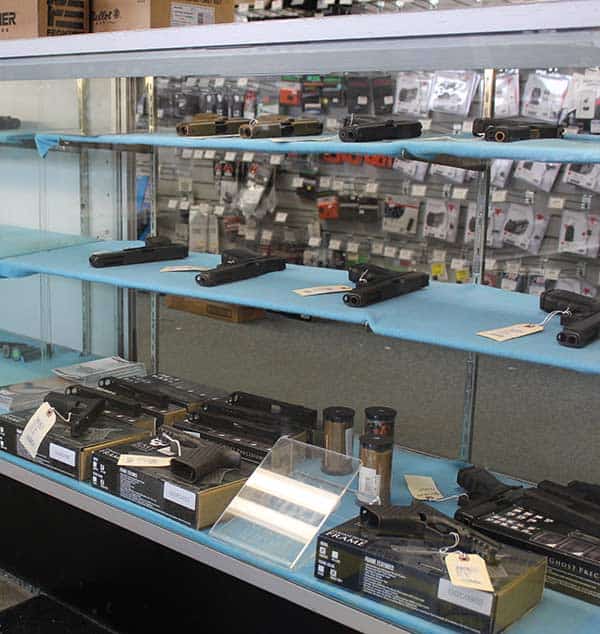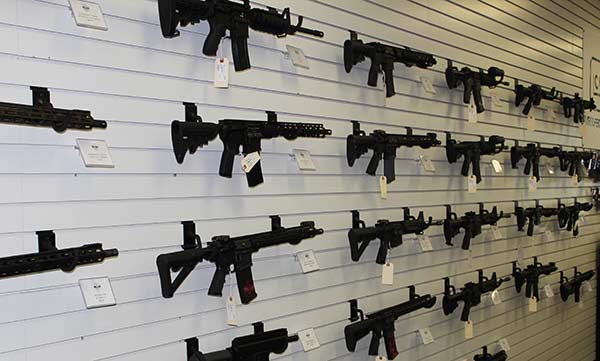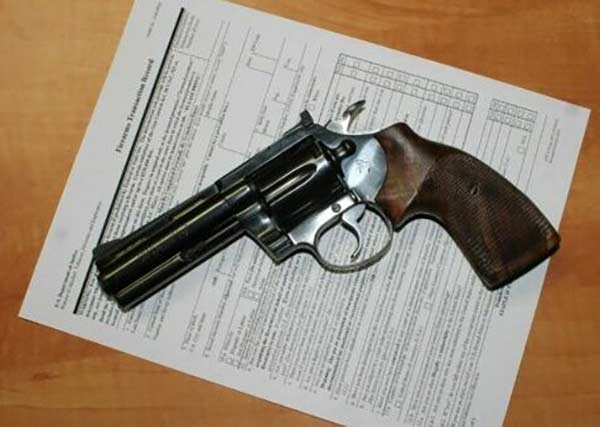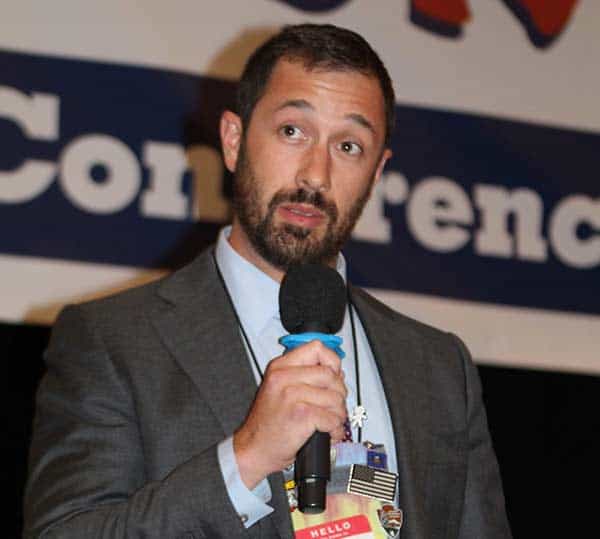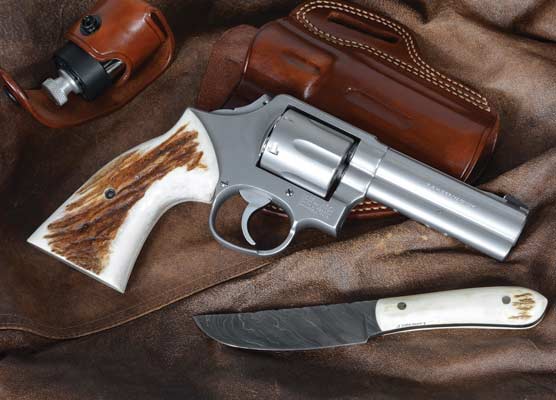Good Guys And Bad News
New Year, Same Old Gun Control
Say hello to Dion Jamar Cooper, 33, of Kent, Washington, who recently set a new standard for gun trafficking in Washington State, and who will begin a three-year stretch in the federal pen next month for — are you sitting down? — personally straw-purchasing 133 guns and, according to the U.S. Attorney in Seattle, handing them over to people who shouldn’t have guns.
This guy, according to a statement from Assistant U.S. Attorney Todd Greenberg, “was the largest known straw purchaser in the history of the western district of Washington.”
Mr. Cooper’s misadventure began back in 2021. His attorney’s explanation for the misbehavior moved the needle toward the surreal. As reported by KOMO News, public defender Sara Brin explained, “Dion’s mindset when he committed these crimes was that everyone had a gun, everyone needed a gun, and he was making sure that people he cared about and the people they cared about weren’t caught out there without one. His mindset now is almost the complete opposite — everyone does not need a gun, and, in fact, the more guns out there, the more dangerous his community is.” Sure, many people have “Come to my senses” moments when they get caught and are sent to the slammer.
Alas, for Cooper, one of his companions was De’Ondre Lamontia Phillips, a convicted felon who drove Cooper around to various gun shops. He’s also now in prison for a seven-year stay on drug charges. Amazing how such folks sort of gravitate toward one another, eh?
The undoing of this little enterprise started with an attempted carjacking two years ago when three thugs tried to take a car from a woman. She was able to flee and call for help, and in the melee, one of the suspects dropped a gun in her car. Oops! When Seattle’s finest checked the gun’s origin, up popped Cooper’s name and when agents with the Bureau of Alcohol, Tobacco, Firearms and Explosives snooped into his activities, they discovered he had purchased 107 guns between June 2021 and that day in early 2023.
So far, 54 of Cooper’s guns have been recovered by police, but more than 70 are still in circulation, and nobody knows who has them.
Why This is Important
Okay, so why are we talking about this? Because Insider’s curiosity revealed the Seattle case is hardly a rarity, and you are getting penalized for every similar legal mess by lawmakers in state capitals all over the map.
Last July in Boston, a Massachusetts man pleaded guilty to distributing fentanyl so he could obtain four firearms from a source in Florida. No background checks, no waiting periods; none of the usual hoops for honest citizens. There’s more.
Meet Bisheem “Bosh” Jones of Philadelphia and fellow Philadelphian Shyheem Woodard-Smith. They’re both doing time for gun trafficking. Jones pulled a 25-year sentence in September 2023 and Woodard-Smith drew a five-year stretch, according to this news release.
Let’s not forget Ryan E. Dales, convicted Dec. 9 of being a felon in possession of a firearm and possession of fentanyl with intent to distribute. According to the Justice Department, when Dales was arrested way back in January 2023, agents found two loaded handguns, one of which was a stolen Smith & Wesson and the other a so-called “ghost gun.”
Nor can we overlook Bishop Allen of Detroit. But he’s not a cleric. He is now a convicted felon for being involved with a gun trafficking scheme in the Motor City. His 2 ½ year sentence seems kind of light for the sort of activity that got him there.
Guys like this give guys like us a bad name and inspire gun prohibition lobbying groups to push legislation aimed at restricting your rights under the guise of making life tough for criminals. For bad guys, doing time behind bars is an occupational hazard. They don’t care about the “collateral damage” resulting from their criminal behavior. Infringements on our rights is “collateral damage.”
An example of this mentality is legislation requiring a permit to purchase a firearm. Oregon’s Measure 114 includes such a requirement, but a judge ruled the initiative to be unconstitutional under Oregon’s state constitution. That case is on appeal with the Oregon Supreme Court.
In neighboring Washington, the Seattle-based Alliance for Gun Responsibility — a billionaire-backed gun prohibition lobbying group — says about such permit requirements: “Permit-to-Purchase laws are proven as the single most effective policy to save lives and reduce gun violence.” Purchase permits are the group’s top agenda item this year. Their 2025 gun control agenda may be read here.
The nagging question: Is the purchase permit requirement constitutional? The courts will have to decide
On The Bright Side
Coming March 4 in the U.S. Supreme Court, justices will hear arguments in a case known as Smith & Wesson Brands, Inc., et.al., v. Estados Unidos Mexicanoshttps://www.supremecourt.gov/DocketPDF/23/23-1141/307919/20240418143513080_S_W%2520Cert%2520Petition.pdf, the outcome of which will determine whether the Mexican government can sue U.S. gun manufacturers for crimes committed south of the border in which American guns are involved.
This lawsuit might be one of the lingering fiascos courtesy of the soon-to-be-history Biden-Harris administration. The case is a challenge of the decades-old Protection of Lawful Commerce in Arms Act, which Joe Biden has falsely and repeatedly asserted provides blanket immunity to the firearms industry from liability actions. The industry knows this isn’t true, but anti-gunners are fanatical about repealing the PLCAA because it will open the door back up to junk lawsuits whose only purpose is to financially drain gun makers to the point of bankruptcy.
Back in the early 2000s, these legal actions cost the industry tens of millions of dollars. Anti-gunners are hoping for some victories, which will cost plenty, but in the process, they know from experience that such litigation is costly.
Adam Kraut, a practicing attorney and executive director of the Second Amendment Foundation, summed it up in a news release: “Allowing Mexico to pierce the Protection in Lawful Commerce of Arms Act would result in foreign countries dictating the types of arms that should be commercially available to Americans. These types of lawsuits, like the one brought by Mexico, are designed with one purpose in mind – to bankrupt the firearms industry and drive it out of existence. Such a result is untenable and directly impacts the right to keep and bear arms. SAF will continue to assert itself in matters that impact American’s ability to acquire arms to exercise their Second Amendment rights.”
“Ghost Stories”
After the suspect in last month’s murder of insurance executive Brian Thompson on a New York sidewalk was rounded up, the media spent almost as much time focusing on reports the killer used a so-called “ghost gun” as they did on the victim.
Literally every report dealing with the arrest of suspect Luigi Mangione zeroed in on the gun. Of course, the gun ban bunch loved it. Things got even more complicated when, according to NBC News, New York Police Department Chief of Detectives Joseph Kenny asserted the murder weapon “might have been made on a 3D printer.” Everybody with a knowledge of firearms gasped at that one since functional firearms need steel barrels, slides and other components.
There were references to “ghost guns” and 3D printing in stories from the New York Post, Axios, WABC in New York, Newsweek and The Hill, and when boiled down, what seemed to occupy the narrative was the fact that “ghost guns” do not have serial numbers. It doesn’t make them any more or less deadly, except in the minds of people who don’t know about guns.
Speaking of which, New York Mayor Eric Adams, quoted by one news agency, said so-called “ghost guns” are “extremely dangerous and we must do more on the federal level to clamp down on the availability of ghost guns.” Nobody has yet provided a plausible explanation about what makes such guns more dangerous than any other gun.
Late last year, the Arizona Department of Health Services (AZDHS) released its 31st annual report on childhood deaths in the Grand Canyon State.
Of the 853 children who died in the state back in 2023, 68 died from gunshot wounds, second only to the 81 who died in car crashes. So, what’s the solution to these “preventable deaths?” The AZDHS Child Fatality Review Program (CFRP) says “the most effective way to prevent firearm-related deaths in children is to remove all firearms in households with children because the presence of firearms in a household increases the risk of suicide among adolescents.” Yeah, that went over well.
“Parents of all adolescents should remove all guns from their homes, especially if there is a history of mental health issues or substance use issues,” the report said. “In addition, CFRP recommends that all gun owners should practice safe storage of their firearms by keeping guns unloaded and locked in a safe separate from the ammunition.”
The review, which is required by the Arizona legislature, has made the same recommendation in the past; however, it is technically an independent body in which the report falls under the purview of the Arizona Department of Health Services.

